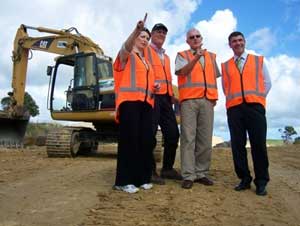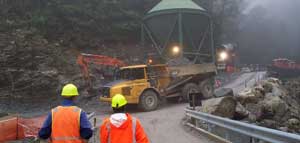Roading Engineer
Tasks & duties

Roading engineers may do some or all of the following:
-
consult members of the public, clients, professionals and government officials
-
examine sites on which work is to be carried out
-
measure and evaluate traffic flow, traffic growth, the reliability of road links, passing lanes and the number of people using road surfaces such as pavements
-
write reports and make recommendations on road development
-
prepare geometric designs and construction specifications
-
prepare cost estimates and evaluate the cost efficiency of projects
-
arrange for contractors to do the work
-
supervise the work in progress
-
ensure building and safety standards are met
-
deal with emergencies such as slips and floods
-
study road-user behaviour
-
keep up to date with roading techniques and technologies
-
participate in crash reduction studies, safety audits and make recommendations about road safety
Skills & knowledge

Roading engineers need to have:
-
knowledge of civil engineering
-
knowledge of relevant legislation such as the Resource Management Act, the New Zealand Building Code, local by-laws and town planning regulations
-
skill in analysing and interpreting information such as client requirements, plans and designs
-
problem-solving skills
-
planning and organisational skills
-
good communication skills
-
writing skills for producing reports
- Computer skills in areas such as computer modelling, GPS (Global Positioning Systems) and CAD (Computer Aided Design) software is also useful.
Entry requirements
To become a roading engineer you need a Bachelor of Engineering. A Diploma in Engineering or equivalent diploma may also be acceptable.
Secondary education
To enter tertiary training, Bursary or NCEA equivalent English, maths with calculus, physics and chemistry is preferred.
Training on the job
Skills are gained on the job. Roading engineers may attend courses, seminars, workshops and conferences to keep their skills up to date.
Roading engineers may apply to the Institution of Professional Engineers New Zealand (IPENZ) to become a chartered professional engineer (CPEng) after:
- completing relevant qualifications
- gaining appropriate work experience (usually four to five years)
- completing a practical competency assessment
To maintain registration, chartered engineers need to demonstrate their ability to practice and display evidence of undertaking professional development at least every five years.
Registration
Roading engineers should be registered with the Institution of Professional Engineers New Zealand (IPENZ).
Useful Experience
Experience working in road construction, draughting or engineering contracting is useful for roading engineers. Experience working as a civil engineering technician or a planner is also useful as an alternative route to being a roading engineer.
Related courses
Building Science and Technology
Construction Engineering
Road Construction
Transport Engineering
For more information, please refer to Career Services.
Document Actions
